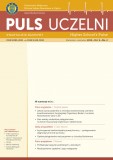Wpływ stresu oksydacyjnego na telomery i długość życia komórek
The effects of oxidative stress on telomeres and cell life span
Author(s): Anna Pańczyszyn, Ewa Boniewska-BernackaSubject(s): Social Sciences, Sociology, Health and medicine and law
Published by: Państwowa Medyczna Wyższa Szkoła Zawodowa w Opolu
Keywords: healt and medicine and law;education;
Summary/Abstract: Oxidative stress is associated with excessive amounts of reactive oxygen species (ROSOS) in the body. The sources of ROSOS constitute the respiratory chain, immune system cells and external factors, e.g. smoking. ROSOS may cause damage and faster shortening of nucleoprotein structures called telomeres, which protect chromosome ends. The consequence of faster shortening of telomeres is aging and death of cells. The aim of this paper was to present the impact of ROSOS on the rate of telomere shortening and cell life span. It is common knowledge that shorter telomeres are associated with higher risk of cardiovascular diseases and tumors. An antioxidant-rich diet, avoiding stress, and physical activity contribute to lower levels of oxidative stress, slower telomere shortening, and longer and healthier life.
Journal: Medical Science Pulse
- Issue Year: 10/2016
- Issue No: 3
- Page Range: 41-44
- Page Count: 4
- Language: English

